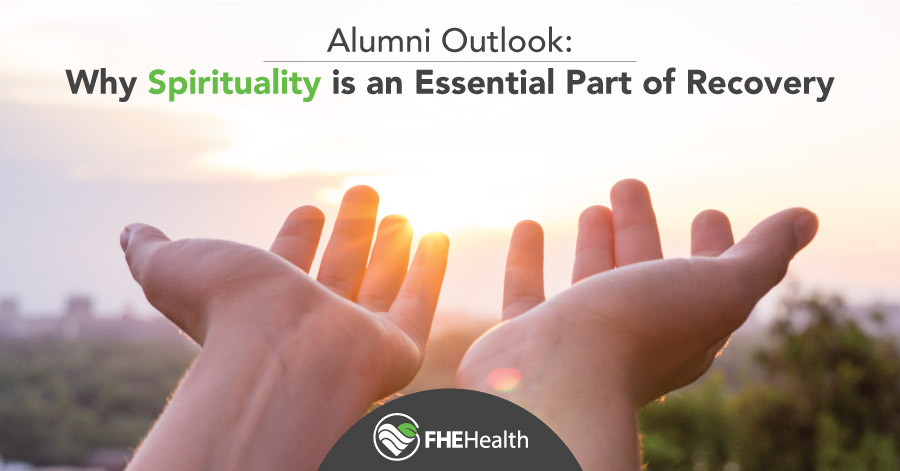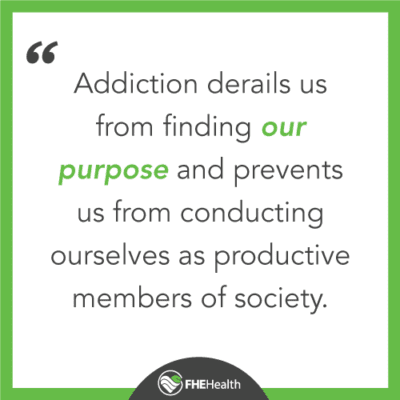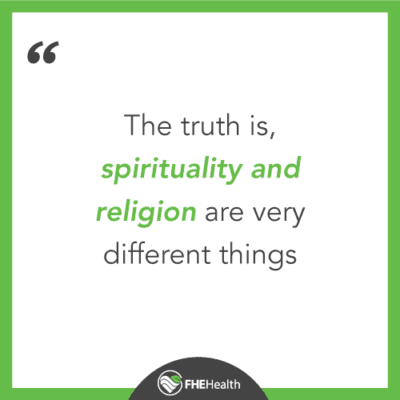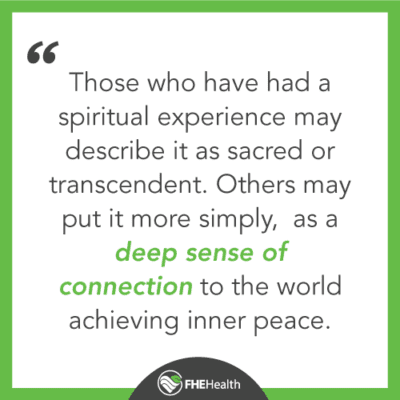
Science and Spirituality: If addiction is a disease of the brain, why is spirituality vital to recovery?
I was your average child growing up: full of hope, purity, and love. As we all do, I had a fundamental yearning for a connection to a spiritual power greater than myself. Life eventually dealt me a handful of trauma and I was ill-equipped — to say the least. Searching for an escape, I sought out oblivion at the bottom of every bottle I could get my hands on.
 It wasn’t long before my childhood was a faint memory of the past and legal consequences brought me to my knees, and my spiritual void cultivated my desperation. I spent every waking moment chasing drugs and alcohol. In fact, my survival depended on it — or so I thought. I was no longer the innocent victim, but rather the self-propelled addict with no real idea of what sobriety entailed. I was utterly dismantled bit by bit, as a direct result of my behaviors and my ravishing addiction. All the while, I was misconstruing the root of my misery.
It wasn’t long before my childhood was a faint memory of the past and legal consequences brought me to my knees, and my spiritual void cultivated my desperation. I spent every waking moment chasing drugs and alcohol. In fact, my survival depended on it — or so I thought. I was no longer the innocent victim, but rather the self-propelled addict with no real idea of what sobriety entailed. I was utterly dismantled bit by bit, as a direct result of my behaviors and my ravishing addiction. All the while, I was misconstruing the root of my misery.
To understand the true nature of the disease of addiction, you must first know that it is a three-fold illness of the mind, body, and spirit. More specifically alcoholism/addiction is made up of three main components: physical allergy, mental obsession, and spiritual sickness. Not only is a strain on our brain due to continual use, but our emotional and spiritual wellbeing as well. Over time we deteriorate into self-centered, dishonest, stubborn, resentful, and self-destructive shells of who we once were.
Mirroring that of a spiritual crisis, we are bankrupt. We are not meant to play the role of the Director of the Universe, but rather we are supposed to be connected with our families, unified with our communities, and serving a purpose outside the realm of ourselves. Addiction derails us from finding our purpose and prevents us from conducting ourselves as productive members of society. A spiritual problem requires a spiritual solution.
Healing From Your Past
 An addict can repair the brain through total abstinence, but that alone will not ensure serenity and genuine happiness. In fact, I experienced this first hand. When I first got sober, I was not thoroughly convinced that underneath the drugs/alcohol I would still exhibit all of the same feelings and behaviors. I spent ten months sober, without any spiritual solution and I was utterly miserable. I could not understand why my life was still so chaotic. In all honesty, I was rebelling against the idea that I needed a spiritual solution. If only everyone would conduct themselves the way I see fit, then everything will be fine. This delusion ultimately led to my relapse. With every failure, I have come to know that there is always some area of growth that follows. Truth be told, I was suffering from a seemingly hopeless state of mind and a spiritual malady that came to fruition long before I ever picked up alcohol.
An addict can repair the brain through total abstinence, but that alone will not ensure serenity and genuine happiness. In fact, I experienced this first hand. When I first got sober, I was not thoroughly convinced that underneath the drugs/alcohol I would still exhibit all of the same feelings and behaviors. I spent ten months sober, without any spiritual solution and I was utterly miserable. I could not understand why my life was still so chaotic. In all honesty, I was rebelling against the idea that I needed a spiritual solution. If only everyone would conduct themselves the way I see fit, then everything will be fine. This delusion ultimately led to my relapse. With every failure, I have come to know that there is always some area of growth that follows. Truth be told, I was suffering from a seemingly hopeless state of mind and a spiritual malady that came to fruition long before I ever picked up alcohol.
Most recovering addicts cringe at the word spirituality or any subject pertaining the matter. After all, most addicts have walked into the trenches of the deepest despair, without any sense of moral compass, and hopelessly covered in shame. Typically, spirituality becomes confused with religion. The idea that spirituality requires religion must be smashed. Often times, the negative connotations associated with religion are due to past experiences, guilt, shame, or remorse. Whatever the reason, lack of spirituality can be detrimental to recovery.
The word “spirituality” can turn a lot of us off from certain recovery programs. Often times, we directly associate spirituality with organized religion. The truth is, spirituality and religion are very different things. When someone is religious, it means they belong to an established religious order. Very different from spirituality, this misconception frequently pushes the addict away from surrendering to the idea of finding and establishing a relationship with a Higher Power.
Spirituality as a Means of Healing
 Spirituality is a much broader concept than religion. The freedom for varying perspectives and experiences is essential for an addict like me, seeking recovery. When speaking in general terms, spirituality refers to a sense of connection to something bigger and greater than ourselves. Spirituality is connected to finding passion and regaining an individual sense of purpose. Spirituality is a universal human experience, something that touches and affects every human being. Those who have had a spiritual experience may describe it as sacred or transcendent. Others may put it more simply, as a deep sense of connection to the world achieving inner peace.
Spirituality is a much broader concept than religion. The freedom for varying perspectives and experiences is essential for an addict like me, seeking recovery. When speaking in general terms, spirituality refers to a sense of connection to something bigger and greater than ourselves. Spirituality is connected to finding passion and regaining an individual sense of purpose. Spirituality is a universal human experience, something that touches and affects every human being. Those who have had a spiritual experience may describe it as sacred or transcendent. Others may put it more simply, as a deep sense of connection to the world achieving inner peace.
In order for an alcoholic to recover, not only must there be healing in the brain but within the character and heart as well. I experienced this healing and change through working the 12 steps. I spent my entire life indulging in self will run riot. My entire life was centered around selfishness, victimization, justified anger, and a thousand forms of fear and I lacked all humility and willingness to accept help from a power greater than myself. Once I first got sober, I began revisiting my conception of God.
Embracing Mindfulness in Recovery
Once I began working the 12 steps, my old ideas were smashed, and I was forced to accept total reconstruction. My spiritual experience was one of the educational variety. I felt as if I was connected to a new part of my soul and spirit that I had been disconnected from for years. Life began to take on a whole new meaning. I found myself experiencing humility, compassion, grace, and unconditional love for the first time.
Finding spirituality is not always an overnight matter. The ability to view all living things as equals is one of the most important perspectives of a spiritual experience. The future and the past become less critical as we begin to focus on the present. When we start seeking spirituality, in recovery, we will become more conscious of those around us. We often feel a sense of unity and connectedness to the world, which can harvest empathy and compassion. For the addict this is especially important; humility and helpfulness become the foundation for an entirely new perspective.
Those who are recovering from drug or alcohol abuse can significantly benefit from finding spirituality. Even seemingly minuscule spiritual experiences can demolish close-mindedness and ignorance while cultivating our sense of purpose. Replacing self-centeredness with love and tolerance of others, we begin to strive to be the best version of ourselves and ultimately aid in helping others achieve the same.






